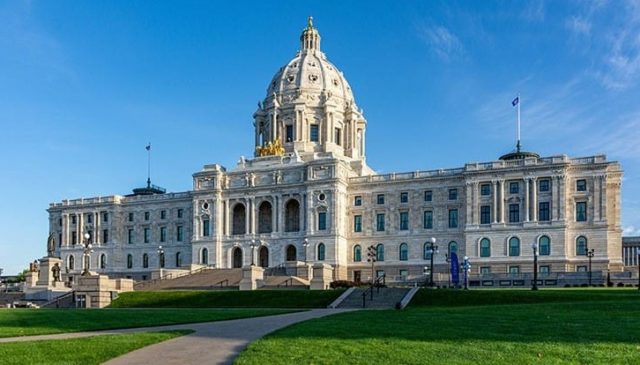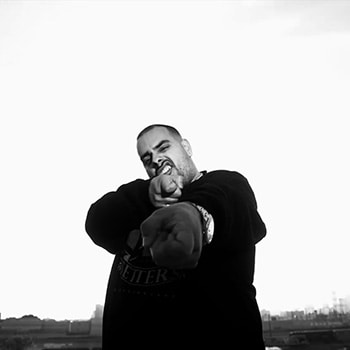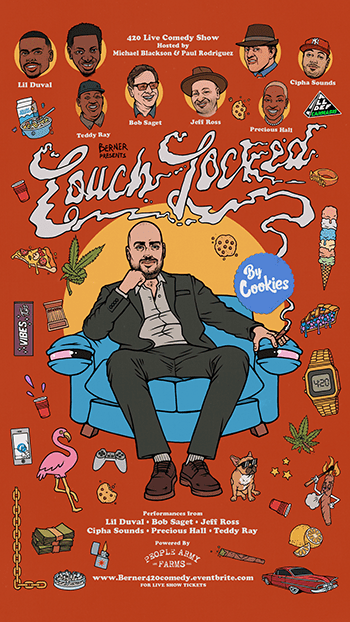
Gilberto “Berner” Milam Jr. has created an empire.
After starting his (legal) cannabis career in the early 2000s as a Bay Area budtender, the rapper/entrepreneur noticed a lack of branding in the nascent industry. With little more than a strong vision, a love for the plant and an inhuman work ethic—he’s confessed to sleeping just four or five hours a night—Berner parlayed one powerful strain into Cookies, a global lifestyle brand with more than 20 dispensaries across the U.S. and Israel, a clothing line and a new digital content platform called Couch Locked Network (CLN).
CLN will launch on 4/20 with an inaugural comedy show, “Couch Locked.” The event touts a who’s-who of famous weed connoisseurs, from Bob Saget to Donnell Rawlings. The hybrid event consists of a live show with limited tickets on an outdoor terrace at a hotel in San Francisco. Viewers not attending in person can tune in via PPV livestream on Veeps.com.
Berner spoke to Cannabis Business Times and Cannabis Dispensary about how the hybrid comedy show came about, increasing Black and brown ownership in the cannabis industry, and what it would take for him to sell Cookies.
Raj Chander: Give us some background on the genesis of “Couch Locked.” How did it come together? Who was involved?

Wikimedia
Berner: I actually designed the logo about five years ago, I’ve been sitting on it for a while. I’ve always wanted to get into the comedy space. … Obviously, smoking bud, you know, it’s just part of what comes with it. You relax. But with COVID being COVID and not wanting to miss another 4/20 event, I thought it was the perfect time to bring a livestream, in-person, limited-ticket comedy show to the table. I wanted to laugh, man, and I feel like the world needed a laugh. We want to bring smiles to people’s faces. … This felt like a good time to implement something I’ve been sitting on.
RC: So, it sounds like you’ve had this idea for a while, even before all the COVID stuff happened, and you were just waiting for the right opportunity?
B: Yeah, I had to level up a little bit, man. I had to get the other businesses going, get the businesses to where I could take on another challenge. Because it’s actually a big challenge to jump into a new space like this and try to sell pay-per-view tickets to a live comedy event. But I think it’s going to be well received, and it’s much needed for sure.
RC: That’s interesting, because to me there’s been such a flood of virtual pop-ups, Zoom things, etc. It’s cool to hear you want to approach it a certain way and be thoughtful about it instead of just rushing into the virtual event space like a lot of others.

B: Well, yeah, if you think about it, I don’t want to watch someone rap. No disrespect to anyone doing streams like that, but for the last year, everyone’s been doing these virtual concerts. Man, you go to a concert to feel the music, to feel the vibe, to feel the energy. So, I was like “OK, what could we do that would be some type of a normal thing?” and I know that when I get high and watch comedy specials, it’s amazing. To see a live comedy special, bring you into that crowd and that atmosphere, people smoking bud while watching the show—that’s some futuristic ass shit.
RC: It seems pretty unique both in terms of the types of people you have and also the format –
B: There’s a lot of diversity in the comedians we have too. Some OGs, some new cats. I mean, we got fucking Bob Saget. It’s amazing. I grew up on “Full House,” dude! I know he’s a dirty birdie when he starts doing his comedy, and you don’t picture Danny Tanner talking like that. San Francisco live? Danny Tanner? Bob Saget? It was a no-brainer, I was like “Get that motherfucker over there!” Hopefully I can get him some weed and get him blazed, man.
RC: What’s been the biggest adjustment you’ve had to make during COVID?
B: I think just working from a distance: having to create and vibe over Zoom or through virtual networking. That shit sucks. I’m an in-person kind of guy, so just being away from that for a year, … not being at some of the store openings was really tough for me. If you go watch some of the old YouTube blogs, I’ll be at the store and I’ll be there from beginning to end. I personally shake everyone’s hand in the line. I don’t care if it’s 8 a.m. til 6 p.m.. So not being there for some of our store openings was really tough, but I think we just adapt and change. In any business, in any situation, you have to learn how to adapt and change and make it work. If not, you’ll be left in the dust.
RC: In light of the police killing of George Floyd last year and now more recently Daunte Wright, there’s been a lot of discussion about equity in the industry: Black and brown ownership, and these big corporations coming in and buying out minority license-holders. How do you think the industry can solve these problems?
B: Well as far as Cookies goes, if anyone wants to have a conversation about working with or trying to acquire us, they should know that this is something I plan on giving to my daughter one day. If they even want to have those kinds of conversations they have to sit down with us, smoke a joint, get high, and see if they’re even the right kind of person. I mean, this vision has been built for a long time. Money’s not gonna move the needle. It’s gotta be something that would complement everything I’ve worked toward.
RC: So you’d be open to that kind of acquisition deal, if the situation was right?
B: Possibly. I mean, look, at the end of the day I want to enjoy my life too. I’ve been working since I was 13. I’ve never stopped working since I was 13. As I go harder and harder as an entrepreneur, I want to enjoy my kids and enjoy my time. You only live one time. But it’d have to be the right situation. They’d have to have pure intentions, they’d have to understand the vision. It’s not gonna be possible, because people in the game now are looking for the money. It’s not about the money—we provide an experience. That’s why I said someone would have to sit down and smoke a joint with us. These big money guys, they don’t even smoke weed. And if they do, they ain’t smoking the shit I grow! That ends a lot of conversations right there too, they’ll be real quiet. Their pitch won’t be so straightforward, might have to sidetrack these motherfuckers a little bit (laughs).
But, I mean, here’s my goal man, keep Black and brown businesses empowered in the cannabis space, keep traditional operators in the game, keep people’s intentions pure and understand that this plant and this business is here for a whole other reason. Yeah. There’s a lot of money behind it, but the shit really unifies people and brings people together. It’s much needed. I don’t care about “recreational” or whatever, this shit is a medicine.
RC: What specifically do you think would be involved in what you mentioned—keeping Black and brown operators in the game—is it the government? Something in the industry, or on the consumer side?
B: It’s a big gumbo of everything. The law that New York passed, some of the tax money coming in will go toward social equity applicants. That was huge, because people being awarded licenses with no money is like being given a key to a house with no house. It doesn’t make sense. So shout out to New York for taking that first step, but I definitely encourage other states that legalize—if you’re gonna take a 30% tax off weed, at least half of that should be dedicated to equity and empowerment programs.
I think another part of it is on operators like myself. We’re building something out called the Cookies University. We’ll have a facility that does everything from A to Z. From cultivation to breeding to operations to manufacturing, dispensary, lounge, nursery, POS system training, everything. We want to empower minorities—all minorities, Asian, Black, Latino, whatever—to come learn the game hands-on from us and get that knowledge, bro. We have houses being built on the facility, and so we can empower and share that knowledge with people and give them a chance to either land a position with us at Cookies or another company.
So it goes from the government giving money out, to people like myself empowering people. We opened up the first Black-owned social equity dispensary in San Francisco (Berner’s on Haight), gave one of the fairest deals ever—that is now a blueprint for what deals should look like in the Bay Area—and make sure it’s not just like a “Let us use your license, we’ll pay you” type of situation. Nah, I trained my partner personally. I hired the staff with him. I’ve known the guy—Shawn Richards—since I was 19 years old. So, besides the money, besides the opportunity, sharing knowledge so he can go and empower other people in his network, open up other stores and build a brand. That shit to me is the most important part.
